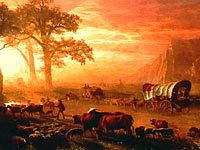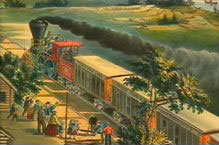Manifest Destiny
 Emigrants Crossing the Plains
Emigrants Crossing the Plains by Albert Bierstadt
National Cowboy and Western Heritage Museum, Oklahoma City
A Go-Ahead Nation
A Conversation With Robert W. Johanssen
University of Illinois at Urbana-Champaign
I don't think that the war with Mexico can be properly understood without placing it in the context of the times, especially in terms of the attitude that Americans had toward themselves and toward the world. This was a period of American Romanticism and the war was extremely important as an expression of that romantic thought.
Romanticism is often times a very elusive concept. It was, of course, a very important period in European intellectual literary history and a lot of the European ideas and expressions came to the United States. For example, Sir Walter Scott and Charles Dickens, two very important figures in the romantic period in England, were extremely popular in the United States. Many of the volunteers who went to fight Mexico had been nurtured on the medieval romances of Sir Walter Scott and were reminded of those tales and settings in so many ways.
How would you describe American Romanticism?
American Romanticism was an off-shoot of this broader intellectual or literary outlook. It was a very optimistic attitude that emphasized feeling and emotion and sentiment as opposed to reason. It was a reaction to the Age of Enlightenment that had gone before. The universe was not a static mechanism as people during the Age of Enlightenment thought, but rather an organic entity that was constantly changing. Change was a fact of life. It was based on the idea of progress and betterment. Perfection was one of the words that represented a common romantic notion.
How did 19th-century Americans express this romantic attitude?
People in the United States had a reputation that they were in awe of nothing and nothing could stand in their way. The word was boundlessness — there were no bounds, no limits to what an individual, society, and the nation itself could achieve. There was a reform spirit involved in the spirit of the age. It was a period of tremendous, exciting change.
 Across the Contient by Fannie Palmer
Across the Contient by Fannie Palmer Amon Carter Museum, Fort Worth
The 1830s and '40s were really the kind of coming of age of the United States, for the American people and their institutions. There were drastic changes in political ways, economic development, and the growth in industrial establishment in this country with technological advances that made individual lives easier than they had ever been before.
One example is the application of steam power to transportation. The United States was often times referred to as a "go-head nation" — a "go-ahead people" with the locomotive almost as a symbol. The railroad became a metaphor for American ingenuity and development.
In printing, the rotary press in 1846 made possible the mass production of newspapers more cheaply than ever before, enabling newspapers to produce for and circulate in the national market rather than just regional or local markets.
Some of the things that were happening bordered on the miraculous, such as the magnetic telegraph in 1844. The very thought of sending words over wires — it just couldn't be. It was a wonder of the world, even surpassing the application of steam power to transportation on land and sea.
What were the drawbacks, if any, to these remarkable changes?
In many ways, this was also an age of paradox because there were anxieties and apprehensions. An erosion of values seemed to be threatened by the changes that took place. The changes were so vast, so important, so penetrating and so much a part of people's lives, that individuals had a hard time adjusting to them. The kind of changes that were taking place during this period of time, in turn, bred a kind of anxiety, restlessness, concern, and apprehension on the part of individuals whose lives were changing. Immigration, of course, was a very important factor that also threatened, in the minds of many Americans, that disrupted the older patterns of the social order.
What did this all mean to the majority of Americans?
Americans were trying to come to terms with these changes and sought some kind of role within the changes that were taking place.
Territorial expansion was but one element in their idea of progress. Journalist, John L. O'Sullivan called it "Manifest Destiny." The phrase first appears in print in July of 1845 in the "Democratic Review" in reference to the Texas issue. O'Sullivan was trying to defend the American claim to Texas and he mentioned that the United States had a Manifest Destiny to overspread the continent with its multiplying millions.
That's one part of an effort to try to maintain and strengthen American republicanism — to extend the boundaries of the United States was to extend the area of freedom.This was a common feeling. The model republic had certain obligations. People over and over were talking about democracy as the best form of government — that it was adapted to the happiness of mankind and was God's plan for mankind. The kind of republican government that United States had was providentially provided since we were the favored nation of God. So, with a spirit of reform, you don't just stand still — you bring the blessing of self-government to as broad an area as possible, extending the area of freedom.
Those notions, Manifest Destiny, for example, were all part of an idea of progress and of the responsibilities and obligations of the model republic and its citizens.
Manifest Destiny today is interpreted largely in terms of territorial expansion, that was but one of the elements, in my belief. There was a popular feeling, that Ralph Waldo Emerson gives voice to when he talks about a destiny that guides individuals, states, and nations. It was a destiny that was providential, especially with respect to the model republic of the United States.
The idea of progress, of course, was involved in this and there was a strong faith in the idea of progress on a popular level in the United States.
So, Manifest Destiny was clear and unavoidable as far as Americans were concerned. It was a destiny that led the United States not only to expand the area of freedom, but was a concept that involved progress in a whole host of different ways. The United States had a destiny to become a world leader, in industrial development, in commercial activity, even in the arts and sciences and intellectual achievements.
This is all part of this idea of boundlessness of no limits. This was a romantic notion that through an act of will, Americans could achieve this greatness for themselves and for their nation. So, Manifest Destiny was an important element that involved so much more than simply extending boundaries.
But why was the United States determined to expand its boundaries as part of its quest for a Manifest Destiny?
The boundaries followed the migrations. When James K. Polk took office as president of the United States, there were about 3,500-4,000 Americans living in the Oregon country, clamoring for a reunion with the United States. There were 800 or so Americans who moved into the interior valleys of California also clamoring for reunion with the United States.
Those who moved West and peopled the Oregon country were filtering to the interior valleys of California by the mid-1840s, undoubtedly seeking economic opportunities that they felt existed in those areas. There was a lot of talk about passage to India and about Asia's teeming millions just waiting for a commercial enterprise and so forth. Oregon and California looked westward,across the Pacific to those two markets.
But at the same time, those individuals never forgot that they were American citizens and they wanted American laws to extend over them. They wanted to be reunited with the United States. They were obsessed with this notion of being kind of a vanguard for the nation while at the same time they were improving themselves.
So, we go back to the same idea of boundlessness with no limits on what people and nations can achieve.
You can't take the Mexican War out of this period and expect to understand it without looking at it in terms of what's going on in the United States. You have to look at the attitudes, of romanticism as well as the threat to a republic and purity and ideology and the idea of a destiny that's guiding individuals and nations. The Mexican War was a part of that. You can't wrench it out of its context and expect to make any sense out of it. The Mexican War was an example of this boundlessness and reform spirit – a quest for a better place for the nation, a test of the model republic and the ability of a democracy to respond to a crisis in the way that it responded to the Mexican War.











